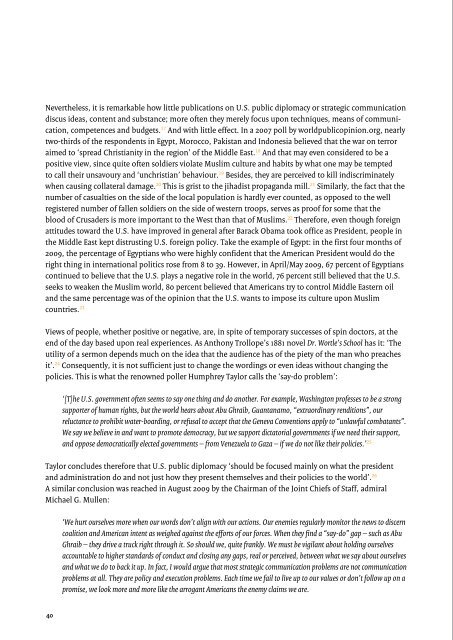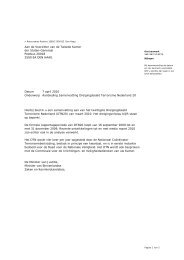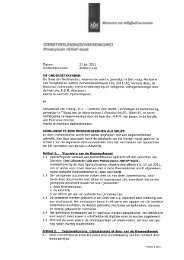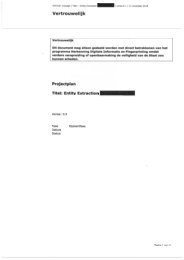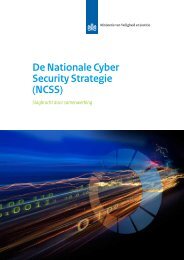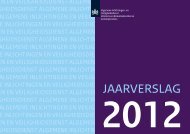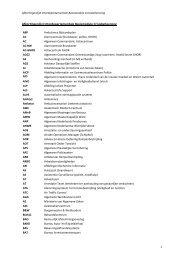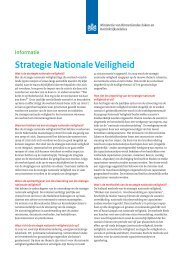Countering Violent Extremist Narratives
Countering Violent Extremist Narratives
Countering Violent Extremist Narratives
- No tags were found...
You also want an ePaper? Increase the reach of your titles
YUMPU automatically turns print PDFs into web optimized ePapers that Google loves.
Nevertheless, it is remarkable how little publications on U.S. public diplomacy or strategic communicationdiscus ideas, content and substance; more often they merely focus upon techniques, means of communication,competences and budgets. 17 And with little effect. In a 2007 poll by worldpublicopinion.org, nearlytwo-thirds of the respondents in Egypt, Morocco, Pakistan and Indonesia believed that the war on terroraimed to ‘spread Christianity in the region’ of the Middle East. 18 And that may even considered to be apositive view, since quite often soldiers violate Muslim culture and habits by what one may be temptedto call their unsavoury and ‘unchristian’ behaviour. 19 Besides, they are perceived to kill indiscriminatelywhen causing collateral damage. 20 This is grist to the jihadist propaganda mill. 21 Similarly, the fact that thenumber of casualties on the side of the local population is hardly ever counted, as opposed to the wellregistered number of fallen soldiers on the side of western troops, serves as proof for some that theblood of Crusaders is more important to the West than that of Muslims. 22 Therefore, even though foreignattitudes toward the U.S. have improved in general after Barack Obama took office as President, people inthe Middle East kept distrusting U.S. foreign policy. Take the example of Egypt: in the first four months of2009, the percentage of Egyptians who were highly confident that the American President would do theright thing in international politics rose from 8 to 39. However, in April/May 2009, 67 percent of Egyptianscontinued to believe that the U.S. plays a negative role in the world, 76 percent still believed that the U.S.seeks to weaken the Muslim world, 80 percent believed that Americans try to control Middle Eastern oiland the same percentage was of the opinion that the U.S. wants to impose its culture upon Muslimcountries. 23Views of people, whether positive or negative, are, in spite of temporary successes of spin doctors, at theend of the day based upon real experiences. As Anthony Trollope’s 1881 novel Dr. Wortle’s School has it: ‘Theutility of a sermon depends much on the idea that the audience has of the piety of the man who preachesit’. 24 Consequently, it is not sufficient just to change the wordings or even ideas without changing thepolicies. This is what the renowned poller Humphrey Taylor calls the ‘say-do problem’:‘[T]he U.S. government often seems to say one thing and do another. For example, Washington professes to be a strongsupporter of human rights, but the world hears about Abu Ghraib, Guantanamo, “extraordinary renditions”, ourreluctance to prohibit water-boarding, or refusal to accept that the Geneva Conventions apply to “unlawful combatants”.We say we believe in and want to promote democracy, but we support dictatorial governments if we need their support,and oppose democratically elected governments – from Venezuela to Gaza – if we do not like their policies.’ 25Taylor concludes therefore that U.S. public diplomacy ‘should be focused mainly on what the presidentand administration do and not just how they present themselves and their policies to the world’. 26A similar conclusion was reached in August 2009 by the Chairman of the Joint Chiefs of Staff, admiralMichael G. Mullen:‘We hurt ourselves more when our words don’t align with our actions. Our enemies regularly monitor the news to discerncoalition and American intent as weighed against the efforts of our forces. When they find a “say-do” gap – such as AbuGhraib – they drive a truck right through it. So should we, quite frankly. We must be vigilant about holding ourselvesaccountable to higher standards of conduct and closing any gaps, real or perceived, between what we say about ourselvesand what we do to back it up. In fact, I would argue that most strategic communication problems are not communicationproblems at all. They are policy and execution problems. Each time we fail to live up to our values or don’t follow up on apromise, we look more and more like the arrogant Americans the enemy claims we are.…Because what we are after in the end – or should be after – are actions that speak for themselves, that speak for us.What we need more than anything else is credibility.’ 27However, it is not only Americans who should do some soul-searching in this respect. Europeans may justas well ask themselves how one can maintain to export democracy and the rule of law to far-away places, ifone simultaneously limits civil rights at home. In the fight against terrorism, the executive power in manywestern countries has been strengthened vis-à-vis parliament and the judicial system. Almost everywhere,the time constraints for detention without charges have been stretched; possibilities for observationand registration have been broadened; facilities for administrative measures have been extended and sohave the possibilities for tapping phones and electronic messages. For instance, the United Kingdom, thecountry where the idea and practice of habeas corpus originated, has, according to its highest freedom-ofinformationofficial, Richard Thomas, sleepwalked into the stage of a surveillance state. 28 According to thehuman rights organisation Privacy International, the U.K. has thus joined China and Russia as an ‘endemicsurveillance state’. 29 Whereas fifty years ago, President Eisenhower warned against the powers of a militaryindustrial-complex,one could utter the same words of caution today against a security-industrial-complex.It almost seems as if the more governmental leaders state that their nations are defending freedoms, thesenations lose their liberties.3. Who should ‘we’ like to be? And what opportunities should ‘they’ like and be given?In his much applauded Cairo speech, which so neatly coincided with the Expert Meeting in The Hague,President Obama did avoid the word ‘Muslim world’, for the use of which in his inaugural address he hadbeen criticised. 30 Instead he still used the words ‘Muslim majority countries’ and ‘Muslim communities’. Infact, he did not take religion out of the rhetoric. He tried to bridge the gap ‘between Islam and the West’,whose relationship included ‘centuries of co-existence and cooperation, but also conflict and religiouswars’. His way out was seeking an end to ‘the cycle of suspicion and discord’ and looking for ‘commonground’. The President said he came to Cairo ‘to seek a new beginning between the United States andMuslims around the world, one based on mutual interest and mutual respect, and one based upon thetruth that America and Islam are not exclusive and need not be in competition. Instead, they overlap,and share common principles - principles of justice and progress; tolerance and the dignity of all humanbeings.’ He appealed to Muslims to confront ‘violent extremists’: ‘The enduring faith of over a billionpeople is so much bigger than the narrow hatred of a few. Islam is not part of the problem in combatingviolent extremism, it is an important part of promoting peace.’ 31Albeit it being a heart-warming speech after so many lost years in which not the offer of dialogue butAmerican monologue dominated, it did not take into account that religious truth and secular truth are twocompletely different things. Perhaps as a an American and a Christian, he may not view this as the problemmany Europeans perceive it to be. The question also remains whether President Obama will be able to movebeyond the rhetoric and his own ‘subtle instinct for public persuasion’, 32 especially in the field of humanrights. In other words: whether he will get rid of the ‘do-say’ problem. President Obama prohibited the useof torture and he ordered the closing down of Guantanamo Bay. But questions remain: Will he manage tostop all human rights abuses and did he in fact abolish the practice of secret prisons and renditions? 33 Willthe administration carry through an inquiry into abuses by the CIA or will it stop short of the ugly truth? 34His predecessor supposed that democracy could be established from above; this is just as erroneous as40 41


